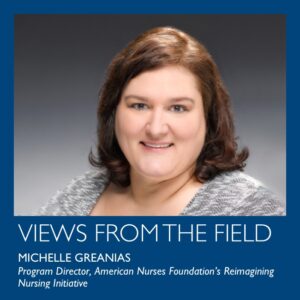Michelle Greanias, Program Director, American Nurses Foundation’s Reimagining Nursing Initiative
When you think about improving health care, who do you envision leading the charge for a more equitable future? There are no wrong answers, but perhaps one that does not immediately come to mind—nurses. Brenan 2023), nurses’ front-line role in patient care makes them a natural force for expanding access to care and reducing health care disparities.
Nurses have the bold, transformative solutions to improve prevention, wellness, and delivery of health care services, but receive too few resources to implement them. As a catalyst of change, the American Nurses Foundation invests directly in nurses to fuel their ability to improve a system that often keeps certain people from obtaining the quality services they need and deserve.
Through the Reimagining Nursing Initiative, the American Nurses Foundation funded bold projects developed and led by nurses to transform nursing for improved access, care, and outcomes for all. The initiative addresses critical pain points within the profession, and all the projects center equity as a priority. Here are some examples:
Preparing nursing students to care for diverse populations
New graduates sometimes face a mismatch between what they learned in their nursing programs and what their jobs require of them. Educational programs often lack a strong focus on having student nurses demonstrate the competencies they will need to be successful in their future practice. In addition, nursing curricula often do not integrate a focus on the social determinants of health—the conditions in the places where people are born, live, learn, work, and age that affect their health—and nurses’ roles in improving health equity.
To address this mismatch, one project is accelerating the adoption of a bold new education model. The model delivers new curriculum and clinical experiences focused on developing competencies that support nurses in addressing social determinants of health and inequities in health care delivery. The schools testing this new model are geographically and institutionally diverse, and many serve rural populations. Further, at least 50 percent of the faculty and nursing students at these institutions come from historically underrepresented backgrounds.
Reducing implicit biases in technology-enabled nursing tools
Nurses routinely use technology-enabled tools to enhance their skills and amplify their contributions to a patient’s care team. However, with tools like predictive models, the risk of implicit biases can drive inequities—leaving patients who are often overlooked even further marginalized.
One project is deploying a predictive tool that utilizes nurses’ notes within hospitalized patients’ records and the frequency with which nurses make those notes to support early prediction of deterioration. This enables care teams to save lives sooner.
By partnering with health systems throughout the country to test the tool, the nurse-led team can detect and mitigate racial, ethnic, gender, and insurance-level bias across different populations. As the project works with different test sites, the team will use the diverse patient and nurse population data to inform the future development of predictive tools while also providing a framework for current models already in clinical use.
Paying nurses to meet patients wherever they are
Research proves that nurses and nurse practitioners positively affect patient outcomes through the provision of high-quality, accessible, and cost-effective care. But often, government and private payment is not set up to reimburse nursing care and coordination, which limits who nurses can treat and where they can provide care.
One solution, which many of our projects are exploring, is convincing public and private payers that nurse-led services—wherever they are provided—should be reimbursed. One project is bringing their care model out of the clinic and into the community to provide comprehensive care for adults living with dementia.
The project focuses on treating adults living in senior living communities, which by nature are medically underserved communities. By focusing on senior living communities, the project is making a case for cost-effective care that can be taken into the home where patients and their caregivers live. The project’s model is uniquely different from other dementia care or domiciliary practices, as it brings multiple specialties to the patient with a one-stop shop approach. For people who have challenges with access to care, having geriatrics, neurology, palliative, and caregiver services all in one practice greatly enhances their access to specialized care and overcomes some of the challenges with accessing care.
Investing in nurse-led projects to drive a more equitable future
The Reimagining Nursing Initiative invested solely in projects that outlined a clear, market-driven path to scale their innovations to enable widespread change and expand access to care. By 2025, each project will deliver evidence demonstrating its impact. These projects can be found in 30 states, covering diverse urban and rural regions, and collectively have the potential to improve the lives of millions of nurses and the many millions of people in their care.
Despite nurses demonstrating they are innovative and capable of addressing inequities in health care, . The American Nurses Foundation is investigating how much philanthropic support goes directly to nurses, and results will be published later this year. Improving health equity depends on us—as grantmaking institutions, we can support and financially resource nurses to drive change and scale their bold and transformative ideas. But more is needed. A more equitable future requires all of us to invest in nurses and their ability to get us there.
If you are interested in learning how you can join us in supporting nurse-led innovations, please reach out to me at michelle.greanias@ana.org. I would love to hear from you. Learn about the American Nurses Foundation’s Reimagining Nursing Initiative and the projects we believe have the potential to reimagine health care at nursingworld.org/rninitiative/.
References
Brenan, Megan. “Nurses Retain Top Ethics Rating in U.S., but Below 2020 High,” Gallup, January 10, 2023.

